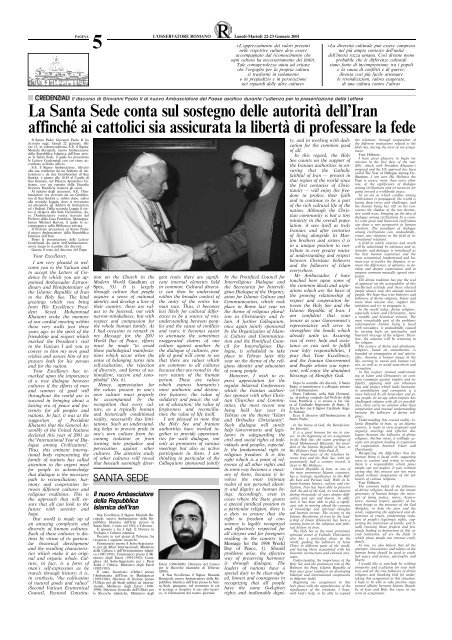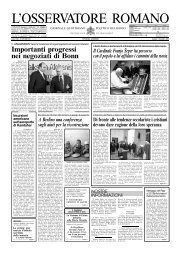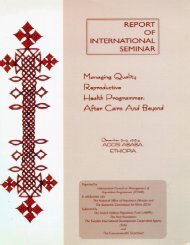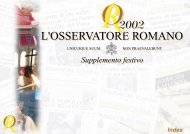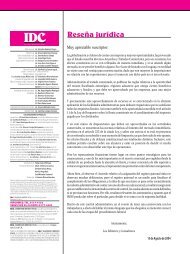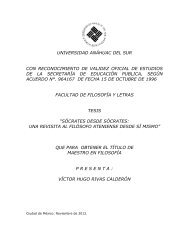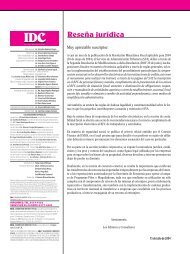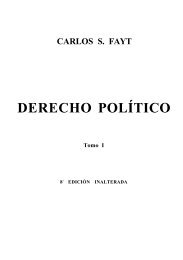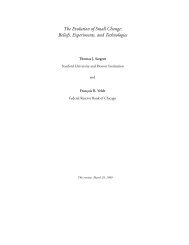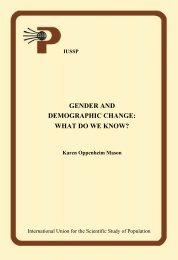You also want an ePaper? Increase the reach of your titles
YUMPU automatically turns print PDFs into web optimized ePapers that Google loves.
.<br />
PAGINA<br />
5 .<br />
SANTA SEDE<br />
L'OSSERVATORE ROMANO Lunedì-Martedì 22-23 Gennaio 2001<br />
«L'apprezzamento dei valori presenti<br />
nelle rispettive culture deve essere<br />
accompagnato dal riconoscimento che<br />
ogni cultura ha necessariamente dei limiti.<br />
Tale consapevolezza aiuta ad evitare<br />
che l'orgoglio per la propria cultura<br />
si trasformi in isolamento<br />
o in pregiudizio e in persecuzione<br />
nei riguardi delle altre culture»<br />
«La diversità culturale può essere compresa<br />
nel più ampio contesto dell'unità<br />
dell'intera razza umana. Così diviene meno<br />
probabile che le differenze culturali<br />
siano fonte di incomprensione tra i popoli<br />
e la causa di conflitti e di guerre;<br />
diventa così più facile attenuare<br />
le rivendicazioni, talora esagerate,<br />
di una cultura contro l'altra»<br />
CREDENZIALI Il discorso di Giovanni Paolo II al nuovo Ambasciatore del Paese asiatico durante l'udienza per la presentazione delle Lettere<br />
La Santa Sede conta sul sostegno delle autorità dell'Iran<br />
affinché ai cattolici sia assicurata la libertà di professare la fede<br />
Il Santo Padre Giovanni Paolo II ha<br />
ricevuto oggi, lunedì 22 gennaio, alle<br />
ore 11, in solenneudienza,S.E. il Signor<br />
Mostafa Borujerdi, nuovo Ambasciatore<br />
della Repubblica Islamica dell'Iran presso<br />
la Santa Sede, il quale ha presentato<br />
le Lettere Credenziali con cui viene accreditato<br />
nell'alto ufficio.<br />
S.E. il Signor Ambasciatore, rilevato<br />
alla sua residenza da un Addetto di Anticamera<br />
e da due Gentiluomini di Sua<br />
Santità, è giunto alle 10.45 al Cortile di<br />
San Damaso, nel Palazzo Apostolico Vaticano,<br />
ove un reparto della Guardia<br />
Svizzera Pontificia rendeva gli onori.<br />
Al ripiano degli ascensori, S.E. l'Ambasciatore<br />
era ricevuto da un Gentiluomo<br />
di Sua Santità e, subito dopo, saliva<br />
alla seconda Loggia, dove si trovavano<br />
ad attenderlo gli Addetti di Anticamera<br />
ed i Sediari. Dalla seconda Loggia il corteo<br />
si dirigeva alla Sala Clementina, dove<br />
l'Ambasciatore veniva ricevuto dal<br />
Prefetto della Casa Pontificia, Monsignor<br />
James Michael Harvey, il quale lo accompagnava<br />
nella Biblioteca privata.<br />
Il Prefetto presentava al Santo Padre<br />
il nuovo Ambasciatore della Repubblica<br />
Islamica dell'Iran.<br />
Dopo la presentazione delle Lettere<br />
Credenziali da parte dell'Ambasciatore,<br />
aveva luogo lo scambio dei discorsi.<br />
Questo il testo del discorso del Papa:<br />
Your Excellency,<br />
I am very pleased to welcome<br />
you to the Vatican and<br />
to accept the Letters of Credence<br />
by which you are appointed<br />
Ambassador Extraordinary<br />
and Plenipotentiary of<br />
the Islamic Republic of Iran<br />
to the Holy See. The kind<br />
greetings which you bring<br />
from His Excellency President<br />
Seyed Mohammad<br />
Khatami evoke the memory<br />
of our cordial meeting within<br />
these very walls just three<br />
years ago: in the spirit of the<br />
friendship and respect which<br />
marked the President's visit<br />
to the Vatican I ask you to<br />
convey to him my own good<br />
wishes and assure him of my<br />
prayers both for his person<br />
and for the nation.<br />
Your Excellency has remarked<br />
upon the importance<br />
of a true dialogue between<br />
cultures if the efforts of men<br />
and women of good will<br />
throughout the world are to<br />
succeed in bringing about a<br />
lasting era of peace and fraternity<br />
for all peoples and<br />
nations. In fact, it was at the<br />
suggestion of President<br />
Khatami that the General Assembly<br />
of the United Nations<br />
declared this year of 2001 as<br />
the“InternationalYearof Dialogue<br />
among Civilizations”.<br />
Thus, this eminent international<br />
body representing the<br />
family of nations has called<br />
attention to the urgent need<br />
for people to acknowledge<br />
that dialogue is the necessary<br />
path to reconciliation, harmony<br />
and cooperation between<br />
different cultures and<br />
religious traditions. This is<br />
the approach that will ensure<br />
that all can look to the<br />
future with serenity and<br />
hope.<br />
Our world is made up of<br />
an amazing complexity and<br />
diversity of human cultures.<br />
Each of these cultures is distinct<br />
by virtue of its particular<br />
historical development<br />
and the resulting characteristics<br />
which make it an original<br />
and organic whole. Culture,<br />
in fact, is a form of<br />
man's self-expression as he<br />
travels through history; it is,<br />
in synthesis, “the cultivation<br />
of natural goods and values”<br />
(Second Vatican Ecumenical<br />
Council, Pastoral Constitu-<br />
tion on the Church in the<br />
Modern World Gaudium et<br />
Spes, 53). It is largely<br />
through culture that people<br />
acquire a sense of national<br />
identity and develop a love of<br />
their country: these are values<br />
to be fostered, not with<br />
narrow-mindedness, but with<br />
respect and compassion for<br />
the whole human family. As<br />
I had occasion to remark in<br />
my Message for the 2001<br />
World Day of Peace, efforts<br />
must be made “to avoid<br />
those pathological manifestations<br />
which occur when the<br />
sense of belonging turns into<br />
self-exaltation, the rejection<br />
of diversity, and forms of nationalism,<br />
racism and xenophobia”<br />
(No. 6).<br />
Hence, appreciation for<br />
the values present in one's<br />
own culture must properly<br />
be accompanied by the<br />
recognition that every culture,<br />
as a typically human<br />
and historically conditioned<br />
reality, necessarily has limitations.<br />
Such an understanding<br />
helps to prevent pride in<br />
one's own culture from becoming<br />
isolation or from<br />
turning into prejudice and<br />
persecution against other<br />
cultures. The attentive study<br />
of other cultures will reveal<br />
that beneath seemingly diver-<br />
Il nuovo Ambasciatore<br />
della Repubblica<br />
Islamica dell'Iran<br />
Sua Eccellenza il Signor Mostafa Borujerdi,<br />
nuovo Ambasciatore della Repubblica<br />
Islamica dell'Iran presso la<br />
Santa Sede, è nato nel 1962 a Teheran.<br />
È sposato e ha 3 figli. È Dottore in<br />
Teologia e Cultura islamica.<br />
Docente in vari atenei di Teheran, ha<br />
ricoperto i seguenti incarichi:<br />
Funzionario presso il Sotto-Segretariato<br />
per gli Affari Internazionali, Ministero<br />
della Cultura e dell'Orientamento islamico<br />
(1987-1991); Funzionario presso il Ministero<br />
degli Esteri (1991-1992); Consigliere<br />
del Sotto-Segretario per i Paesi<br />
Arabi e l'Africa, Ministero degli Esteri<br />
(1992-1993).<br />
È stato Incaricato d'Affari presso<br />
l'Ambasciata dell'Iran in Madagascar<br />
(1993-1996); Direttore di Sezione presso<br />
l'Ufficio per gli Studi politici ed internazionali,<br />
Ministero degli Esteri (1996-<br />
1998); Direttore Generale dell'Ufficio per<br />
le Ricerche islamiche, Ministero degli<br />
gent traits there are significant<br />
internal elements held<br />
in common. Cultural diversity<br />
can then be understood<br />
within the broader context of<br />
the unity of the entire human<br />
race. Thus, it becomes<br />
less likely for cultural differences<br />
to be a source of misunderstanding<br />
between peoples<br />
and the cause of conflicts<br />
and wars; it becomes easier<br />
to attenuate the sometimes<br />
exaggerated claims of one<br />
culture against another. In<br />
the dialogue of cultures, people<br />
of good will come to see<br />
that there are values which<br />
are common to all cultures<br />
becausetheyarerootedin the<br />
very nature of the human<br />
person. These are values<br />
which express humanity's<br />
most authentic and distinctive<br />
features: the value of<br />
solidarity and peace; the value<br />
of education; the value of<br />
forgiveness and reconciliation;<br />
the value of life itself.<br />
I am pleased to note that<br />
the Holy See and Iranian<br />
authorities have worked together<br />
to provide opportunities<br />
for such dialogue, not<br />
only as promoters of various<br />
meetings but also as active<br />
participants in them. I am<br />
thinking in particular of the<br />
Colloquium sponsored jointly<br />
Esteri (1998-2000); Direttore del Centro<br />
per le Ricerche islamiche di Teheran<br />
(2000).<br />
A Sua Eccellenza il Signor Mostafa<br />
Borujerdi, nuovo Ambasciatore della Repubblica<br />
Islamica dell'Iranpressola Santa<br />
Sede, giungano, nel momento in cui<br />
si accinge a ricoprire il suo alto incarico,<br />
le felicitazioni del nostro giornale.<br />
by the Pontifical Council for<br />
Interreligious Dialogue and<br />
the Secretariat for InterreligiousDialogueoftheOrganization<br />
for Islamic Culture and<br />
Communication, which took<br />
place in Rome last year on<br />
the theme of religious pluralism<br />
in Christianity and Islam.<br />
A further Colloquium,<br />
once again jointly sponsored<br />
by the Organization of Islamic<br />
Culture and Communication<br />
and the Pontifical Council<br />
for Interreligious Dialogue,<br />
is scheduled to take<br />
place in Tehran later this<br />
year on the theme of the religious<br />
identity and education<br />
of young people.<br />
Moreover, I wish to express<br />
appreciation for the<br />
regular bilateral Conferences<br />
which the Iranian authorities<br />
sponsor with other Christian<br />
Churches and Communities,<br />
the most recent one<br />
being held last year in<br />
Tehran on the theme “Islam<br />
and Orthodox Christianity”.<br />
Such dialogue will surely<br />
help Governments and legislators<br />
in safeguarding the<br />
civil and social rights of individuals<br />
and peoples, especially<br />
the fundamental right to<br />
religious freedom. It is this<br />
right which is a point of reference<br />
of all other rights and<br />
insomewaybecomesa measure<br />
of them, because it involves<br />
the most intimate<br />
realm of our personal identity<br />
and dignity as human beings.<br />
Accordingly, even in<br />
cases where the State grants<br />
a special juridical position to<br />
a particular religion, there is<br />
a duty to ensure that the<br />
right to freedom of conscience<br />
is legally recognized<br />
and effectively respected for<br />
all citizens and for foreigners<br />
residing in the country (cf.<br />
Message for the 1998 World<br />
Day of Peace, 1). Should<br />
problems arise, the effective<br />
way of preserving harmony<br />
is through dialogue. The<br />
leaders of nations have a<br />
special duty to be clear-sighted,<br />
honest and courageous in<br />
recognizing that all people<br />
have the same God-given<br />
rights and inalienable digni-<br />
ty, and in working with dedication<br />
for the common good<br />
of all.<br />
In this regard, the Holy<br />
See counts on the support of<br />
the Iranian authorities in ensuring<br />
that the Catholic<br />
faithful of Iran — present in<br />
that region of the world since<br />
the first centuries of Christianity<br />
— will enjoy the freedom<br />
to profess their faith<br />
and to continue to be a part<br />
of the rich cultural life of the<br />
nation. Although the Christian<br />
community is but a tiny<br />
minority in the overall population,<br />
it sees itself as truly<br />
Iranian; and after centuries<br />
of living alongside its Muslim<br />
brothers and sisters it is<br />
in a unique position to contribute<br />
to ever greater mutual<br />
understanding and respect<br />
between Christian believers<br />
and the followers of Islam<br />
everywhere.<br />
Mr Ambassador, I have<br />
touched here upon some of<br />
the commonidealsand aspirations<br />
which are the basis of<br />
the growing relationship of<br />
respect and cooperation between<br />
the Holy See and the<br />
Islamic Republic of Iran. I<br />
am confident that your<br />
tenure as your Government's<br />
representative will serve to<br />
strengthen the bonds which<br />
already unite us. Assuring<br />
you of every help and assistance<br />
as you seek to fulfill<br />
your lofty responsibilities, I<br />
pray that Your Excellency,<br />
and the Iranian Government<br />
and People whom you represent,<br />
will enjoy the abundant<br />
blessings of Almighty God.<br />
Dopo lo scambio dei discorsi, il Santo<br />
Padre si intratteneva a colloquio privato<br />
con l'Ambasciatore.<br />
Dopo l'udienza, nella Sala Clementina,<br />
prendeva congedo dal Prefetto della<br />
Casa Pontificia e si recava a far visita<br />
al Cardinale Segretario di Stato, S.<br />
Em.za Rev.ma il Signor Cardinale Angelo<br />
Sodano.<br />
Ecco il discorso dell'Ambasciatore al<br />
Santo Padre:<br />
In the Name of God, the Beneficient,<br />
the Merciful.<br />
It is a great honour for me to convey,<br />
in the beginning of my assignment<br />
in the Holy See, the warm greetings of<br />
Seyed Mohammad Khatami, the president<br />
of the Islamic Republic of Iran, to<br />
His Holiness Pope John Paul II.<br />
The importance of the relations between<br />
Iran and the Holy See, with approximately<br />
half a century record, is<br />
clear to His Holiness.<br />
Islamic Republic of Iran, as one of<br />
the most prominent Islamic countries,<br />
has a strategic significance in the Middle<br />
East and Persian Gulf. With its Islamic-Iranian<br />
history, culture and civilization,<br />
Iran has been able to preserve<br />
with the aid of the God, its real identity<br />
during thousands of years despite difficulties<br />
and ups and downs. In addition,<br />
it has been able to play a significant<br />
role in moving ahead the caravan<br />
of knowledge and spiritual thoughts<br />
and human virtues. The victory of the<br />
Islamic Revolution of Iran by the leadership<br />
of Imam Khomeini has been a<br />
turning point in the religious and political<br />
history of Iran.<br />
The Holy See as the most prominent<br />
spiritual center of Catholic Christianity<br />
also has a particular place in the<br />
world, guiding the followers of Jesus<br />
Christ in different parts of the world,<br />
and having them acquainted with his<br />
heavenly instructions and celestial messages.<br />
Understanding the importance of the<br />
Holy See and the prominent role of His<br />
Holiness the Pope, Islamic Republic of<br />
Iran puts great emphasis on developing<br />
bilateral and international cooperation<br />
in different fields.<br />
Beginning my assignment in this<br />
holy place with the apprehension of the<br />
significance of the relations, I hope,<br />
with God's help, to be able to expand<br />
the relations, through cooperation of<br />
the different institutions related to the<br />
Holy See, during the term of my assignment.<br />
Your Holiness,<br />
I have great pleasure to begin my<br />
mission in the first days of the year<br />
2001, which with President Khatami's<br />
proposal and the UN approval has been<br />
called The Year of Dialogue among Civilizations.<br />
I am sure His Holiness the<br />
Pope is aware, more than every other<br />
one, of the significance of dialogue<br />
among civilizations and its necessity for<br />
going toward a worldwide peace.<br />
In an era in which conflict among<br />
civilizations is propagated, the world is<br />
facing deep crises and challenges, and<br />
the human being has still on his conscience<br />
the shadow of the two destructive<br />
world wars, bringing up the idea of<br />
dialogue among civilizations by a country<br />
with great and historical civilization<br />
can draw a new perspective in human<br />
relations. The paradigm of dialogue<br />
among civilizations can, undoubtedly,<br />
create new relations in the field of international<br />
relations.<br />
A field in which violence and wrath<br />
will be substituted by tolerance and rationality<br />
and dialogue is introduced as<br />
the best human experience and the<br />
most economical fundamental and human<br />
way to resolve the disputes, to remove<br />
the differences of opinions, to develop<br />
and deepen cooperation and to<br />
propose common mutually agreed viewpoints.<br />
The divine tradition has put the seal<br />
of approval on the acceptability of this<br />
intellectual attitude and those selected<br />
people always took this attitude toward<br />
people. We hope that wise believers and<br />
followers of divine religions, before and<br />
more than anyone else, support this<br />
initiation and try to propagate it.<br />
In the world today, divine religions,<br />
especially Islam and Christianity, have<br />
a notable and historical mission. The<br />
most remarkable part of the problems<br />
contemporary human being is faced<br />
with nowadays, is undoubtedly caused<br />
by turning back on spirituality and<br />
heavenly message of the religion. Therefore,<br />
the solution will be returning to<br />
the religion.<br />
The essence of divine and abrahamic<br />
religions, based on monotheism, is<br />
founded on propagation of real spirituality,<br />
showing a human image of the<br />
life, turning to moral and human values,<br />
as well as to avoid anarchism and<br />
corruption.<br />
In this respect, mutual understanding<br />
of Islam and Christianity on common<br />
campaign against impiety and infidelity,<br />
opposing with any inhuman<br />
idea and project which leads humanity<br />
to annihilation and corruption is a<br />
must believed by all benevolent and pious<br />
people. In an age when impiety has<br />
challenged religion with all its possibilities,<br />
there exists no solution other than<br />
cooperation and mutual understanding<br />
between the followers of divine religions.<br />
Understanding this crucial reality, Islamic<br />
Republic of Iran, as an Islamic<br />
country, is ready to view proposals and<br />
organize meetings and effective dialogues<br />
between the followers of divine<br />
religions. Further more, it willingly accepts<br />
any program leading to expansion<br />
of cooperation between Islam and<br />
Christianity.<br />
Recognizing the difficulties that the<br />
human being is faced with, suggesting<br />
ways to counter and trying to resolve<br />
them is a responsibility which pious<br />
people can not neglect. It goes without<br />
saying that this process can not move<br />
ahead without cooperation of the followers<br />
of various religions.<br />
Your Holiness,<br />
The common belief of the followers<br />
of divine religions based on the innate<br />
generosity of human beings, the necessity<br />
of doing justice, mercy, benevolence,<br />
mutual respect, equality of human<br />
beings in the presence of the God<br />
Almighty, to help the poor and the<br />
weak, supporting the oppressed and abhorrence<br />
of cruels, condemning violation<br />
of people's legitimate rights, supporting<br />
the institution of family, and finally<br />
rejecting those projects and proposals<br />
leading to destruction of this sacred<br />
institution, all are the fields in<br />
which pious people can interact confidently.<br />
As you, we also believe that all the<br />
attempts, innovations and talents of the<br />
human being should be used to establish<br />
peace and justice, spirituality and<br />
liberty.<br />
I would like to conclude by wishing<br />
prosperity and exaltation for your holiness<br />
and all the true followers of divine<br />
religions and thanking God for undertaking<br />
this assignment in this situation.<br />
I hope to be able to take positive steps<br />
toward affinity between Islamic Republic<br />
of Iran and Holy See views in my<br />
term of assignment.


